artificialintelligence
Latest

Google's News app is a tool for gaining perspective, not an arbiter of facts
It may have been overshadowed by Android P or a slightly terrifying AI phone call, but Google's new News app was one of the most important things the search giant announced at I/O this year. It relies completely on artificial intelligence to bring you breaking news, but the most fascinating -- and potentially most valuable -- addition is what Google calls Full Coverage. Fire up the News app on your Android phone and you'll see a tiny icon in the corner of certain stories -- tap that and you're taken to a dedicated page that surfaces related stories Google's AI deems trustworthy.
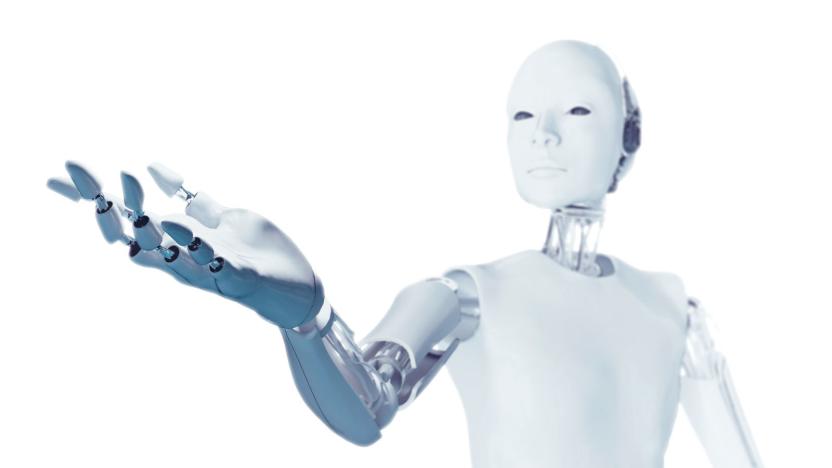
Google’s AI advances are equal parts worry and wonder
I laughed along with most of the audience at I/O 2018 when, in response to a restaurant rep asking it to hold on, Google Assistant said "Mmhmm". But beneath our mirth lay a sense of wonder. The demo of Google Duplex, "an AI system for accomplishing real-world tasks over the phone," was almost unbelievable. The artificially intelligent Assistant successfully made a reservation with a human being over the phone without the person knowing it wasn't real. It even used sounds like "umm," "uhh" and tonal inflections to create a more convincing, realistic cadence. It was like a scene straight out of a science fiction movie or Black Mirror.

Carnegie Mellon offers undergrad degree in artificial intelligence
Carnegie Mellon has announced one of the first* AI-focused undergraduate degrees in the US to address the increasing demand for specialists in the field. Tech giants like Google have been ramping up their artificial intelligence efforts in recent years, since they've become integral in the development of machine learning techniques used for their products. Mountain View, for instance, recently showed off a talking AI assistant so human-like that the company had to design a feature to make sure it identifies itself as a robotic assistant before speaking. The university is perhaps the best institution to offer an undergrad degree in AI, considering it ranked first in a recent study of the top AI graduate programs in the country.
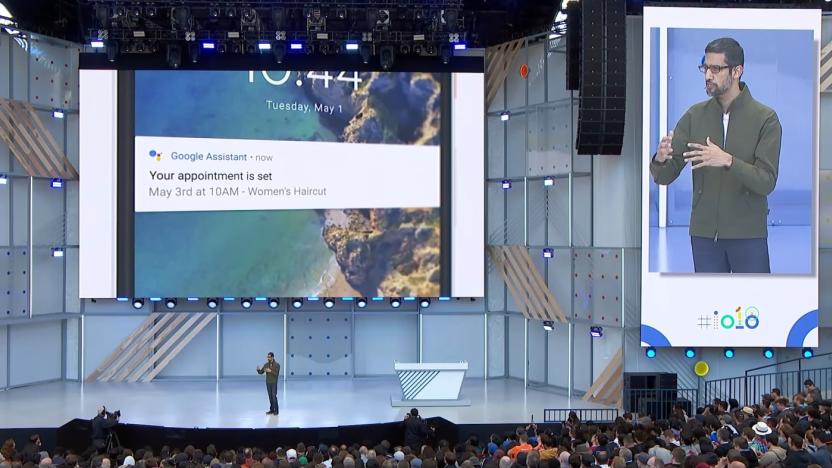
Google: Duplex phone calling AI will identify itself
After an impressive Google I/O demo where its Duplex AI system called a restaurant and salon to set up appointments, one of the big questions concerned the ethics of the technology. The Google Assistant voice took steps to pretend to be human, inserting "umms" and "ahs" into the conversation while a person on the other end appeared to be unaware that they were talking to a program. As a Turing Test candidate, it was impressive, but we'd like to know if the "person" who just called us has a heartbeat and a favorite One Direction member.

Trump administration takes a hands-off approach to AI
The Trump administration has a simple approach to regulating artificial intelligence: developers pretty much have free reign to experiment. At a meeting with representatives of 40 companies including Google, Facebook and Intel, White House science advisor Michael Kratsios said the administration will avoid AI regulations for the foreseeable future, Bloomberg reported.
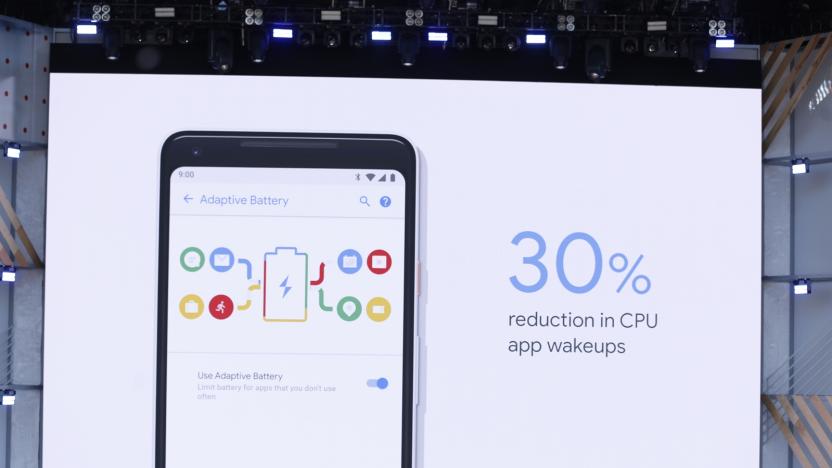
Android P taps AI to help save your battery life
Today at the Google I/O keynote, the search giant took the opportunity to showcase all the new ways artificial intelligence will revolutionize its phone OS with the upcoming Android P. One of the least sexy AI applications might benefit the most users. Adaptive Battery, as it's called, takes note of user behavior to cunningly switch off apps when it predicts you'll need them least -- and will result in a 30 percent reduction in CPU app wake-ups, which should save you some juice.

Amazon, Google and Microsoft to attend White House AI summit
The Trump administration hasn't exactly been receptive to AI -- Treasury Secretary Steven Mnuchin once said it was "not even on [his] radar screen." However, it's warming up. The White House is holding a summit on May 10th where representatives from 38 companies (including Amazon, Facebook, Google and Intel) will discuss how the government can fund AI research and alter regulations to advance the technology. A Washington Post source said the government was also mulling proposals that could include providing more data for AI research.
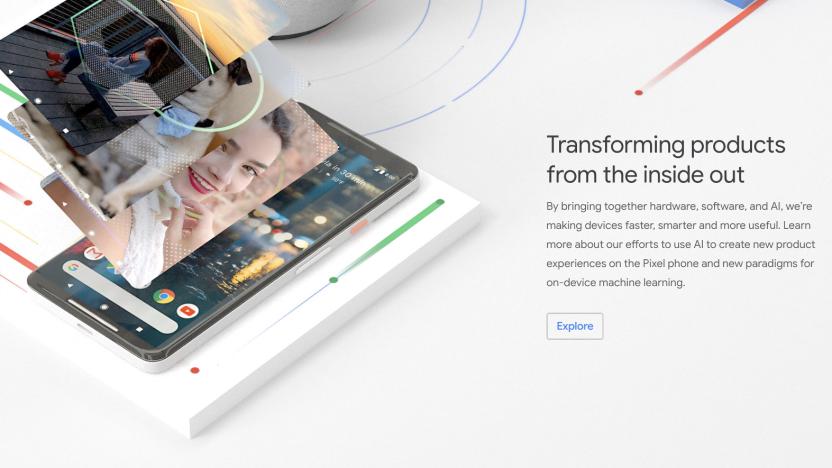
'Google AI' is the new home of Google's research and AI divisions
Google Research is no more. The tech titan has combined all of its Google Research projects and artificial intelligence efforts under one umbrella simply called "Google AI." Mountain View says it unified "all the state-of-the-art research happening across Google" under one straightforward name because its work in AI has been core to the development of all the machine learning techniques it's implementing in its products and platforms. The company has conducted tons of AI research and development over the years, including a recent one in which it launched websites where you can talk to books and play word-association Tetris.

Microsoft's AI future is rooted in its gaming past
The Kinect will never die. Microsoft debuted its motion-sensing camera on June 1st, 2009, showing off a handful of gimmicky applications for the Xbox 360; it promised easy, controller-free gaming for the whole family. Back then, Kinect was called Project Natal, and Microsoft envisioned a future where its blocky camera would expand the gaming landscape, bringing everyday communication and entertainment applications to the Xbox 360, such as video calling, shopping and binge-watching. This was the first indication that Microsoft's plans for Kinect stretched far beyond the video game industry. With Kinect, Microsoft popularized the idea of yelling at our appliances -- or, as it's known today, the IoT market. Amazon Echo, Google Home, Apple's Siri and Microsoft's Cortana (especially that last one) are all derivative of the core Kinect promise that when you talk to your house, it should respond.

Microsoft repurposes Kinect to boost AI and Azure development
Kinect didn't die, it just changed forms. Today at its annual Build developers conference, Microsoft announced Project Kinect for Azure saying that the sensor array will have all the capabilities we're familiar with, but in a smaller more power-efficient package. Meaning, time of flight depth sensors, IR sensors and more, now with Azure AI. "Building on Kinect's legacy that has lived on through HoloLens, Project Kinect for Azure empowers new scenarios for developers working with ambient intelligence," Microsoft said.

Facebook: AI will protect you
Artificial intelligence is a key part of everything Facebook does, from chatbots in Messenger to powering the personalized recommendations you get on apps like Instagram. But, as great as the technology is to create new and deeper experiences for users, Facebook says the most important role of AI lies in keeping its community safe. Today at F8, the company's chief technology officer, Mike Schroepfer, highlighted how valuable the tech has become to combating abuse on its platform, including hate speech, bullying and terrorist content. Schroepfer pointed to stats Facebook revealed last month that showed that its AI tools removed almost two million pieces of terrorist propaganda, with 99 percent of those being spotted before a human even reported them.
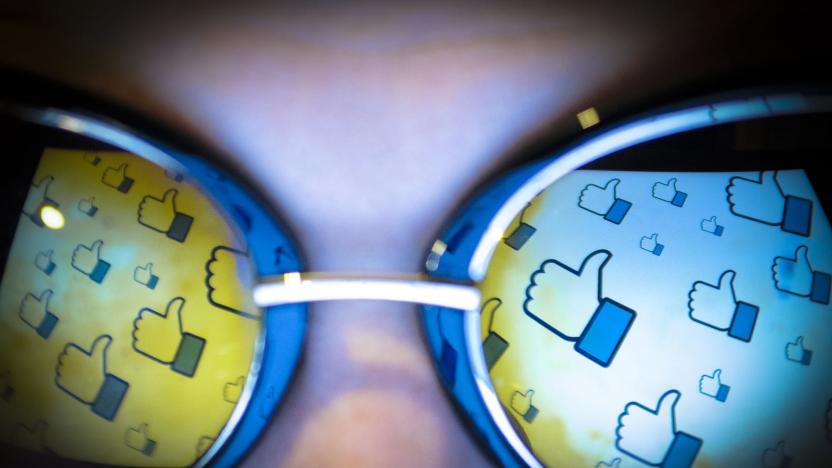
Facebook shrinks fake news links in hopes you'll miss them
Facebook has tried numerous methods in a bid to fight fake news. Not all of them are successful, though, and it's now clear that they can even backfire. Its decision to flag false stories led to more sharing as those determined to believe the claims were incensed. The social network has a new strategy, though: rather than draw attention to the links, it's shrinking them. Facebook told TechCrunch that it's reducing the "visual prominence" of known false stories. You may only see a tiny thumbnail and brief text description for a hoax, but an accurate story will have a large image and bold text. The aim, as you've no doubt guessed, is to boost the chances you'll miss a bogus story while scrolling through your News Feed.

Axon opens ethics board to guide its use of AI in body cameras
Axon (formerly Taser) is keenly aware of the potential for Orwellian abuses of facial recognition, and it's taking an unusual step to avoid creating that drama with its body cameras and other image recognition systems. The police- and military-focused company has created an AI ethics board that will convene twice per year (on top of regular interactions) to discuss the ramifications of upcoming products. As spokesperson Steve Tuttle explained to The Verge, this will ideally establish a set of "AI ethics principles" within police work where certain uses are off-limits.
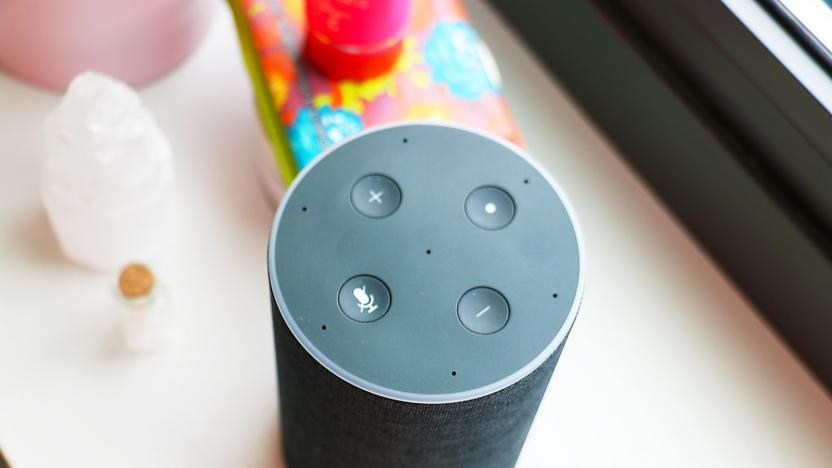
Alexa will soon have a memory
You'd be forgiven for thinking that Amazon's Alexa was an amnesiac: it can't remember important long-term info, or even that you started talking to it a few moments ago. Soon, though, it'll be considerably less forgetful. Amazon's Ruhi Sarikaya has detailed a string of upgrades to Alexa that promise more natural conversations, particularly about familiar subjects. Most notably, Alexa devices in the US will soon have a memory: you can tell the voice assistant to remember an important fact (say, a friend's birthday) and bring that up later.

YouTube still has an ad problem
YouTube's problem with automated ads appearing on extremist channels isn't getting any better. A recent CNN investigation revealed that companies including Adidas, Amazon, Hershey, Netflix and Under Armour -- and even the US government -- had their ads placed on unsavory channels.

Pornhub hasn't been actively enforcing its deepfake ban
Remember how Pornhub said it was banning AI-generated deepfake videos? They're still a problem months later. BuzzFeed News "easily" found over 100 of the non-consensual videos by searching for obvious keywords like "deepfake" and "fake deep," nearly all of them explicitly mentioning their deepfake status in the title or the uploader's username. The clips had been around for a while, too, as they had hundreds of thousands or even millions of views. Some videos surfaced in home page recommendations.

Google's latest do-it-yourself AI kits include everything you need
Google's AIY kits have been helpful for do-it-yourselfers who want to explore AI concepts like computer vision, but they weren't really meant for newcomers when you had to supply your own Raspberry Pi and other must-haves. It'll be much easier to get started from now on: Google has released updated AIY Vision and AIY Voice kits that include what you need to get started. Both include a Raspberry Pi Zero WH board and a pre-provisioned SD card, while the Vision Kit also throws in a Raspberry Pi Camera v2. You won't be going on extra shopping trips (or downloading software) just to get the ball rolling.

Google AI experiment has you talking to books
Google Research is giving us a (fun) glimpse of how far natural language processing in artificial intelligence has come. Mountain View's research division has rolled out a couple of what it calls Semantic Experiences, which are websites with interesting activities that demonstrate AIs' ability to understand how we speak. One of the two experiences is called "Talk to Books," because, well, you can use the website to talk to books to a certain extent. You simply type in a statement or a question, and it will find whole sentences in books related to what you typed.
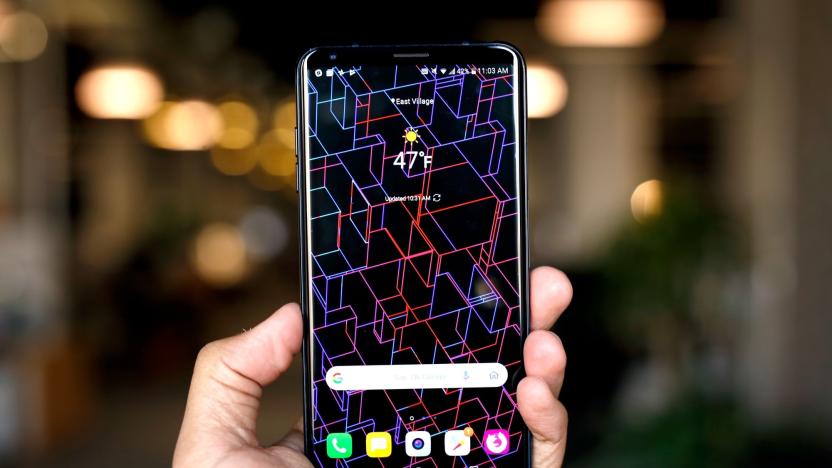
LG V30S ThinQ review: A solid but pointless phone
It had its fair share of flaws, but last year's LG V30 might have been the finest phone the company had made to date. Rather than wait the usual year for an official sequel, though, LG decided to spice things up a bit by unveiling a tweaked version of the phone at Mobile World Congress. Interestingly, the AI-fueled camera features that make the new V30S ThinQ special will also wind up on the original, rendering most arguments for buying this updated model moot. Despite being a perfectly solid smartphone with some notable improvements over the original, I can't help but think the V30S ThinQ is ultimately pointless. Oh, and one more thing before we dive in: This isn't a typical review. We received this preproduction V30S ThinQ during the tail end of MWC, and it's running a Korea-specific build of Android 8.0 Oreo. It's been enough to get a feel for what the V30S experience is all about, but we'll update this story with firmer conclusions when a retail-ready US model becomes available. Actually, I should say "if" a US model becomes available: The phone is already available for a hefty sum in its native South Korea, but with the G7's global launch coming quickly, it's possible we won't see the V30S in the US at all.
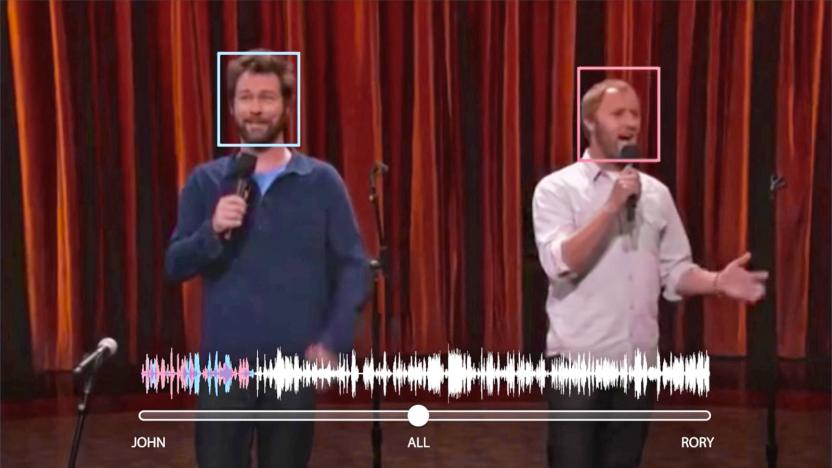
Google AI can pick out voices in a crowd
Humans are usually good at isolating a single voice in a crowd, but computers? Not so much -- just ask anyone trying to talk to a smart speaker at a house party. Google may have a surprisingly straightforward solution, however. Its researchers have developed a deep learning system that can pick out specific voices by looking at people's faces when they're speaking. The team trained its neural network model to recognize individual people speaking by themselves, and then created virtual "parties" (complete with background noise) to teach the AI how to isolate multiple voices into distinct audio tracks.









